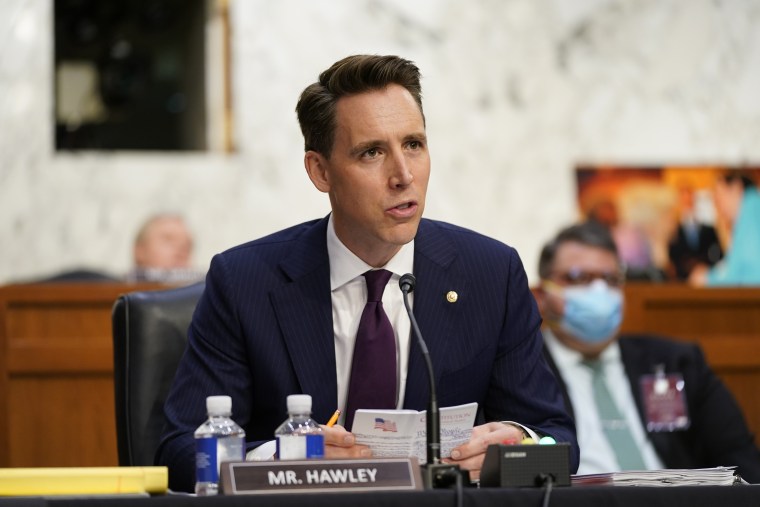It was on Wednesday, Dec. 30, that Sen. Josh Hawley (R-Mo.) thought he'd come up with a clever political move. While his own party's leaders pleaded with senators not to object when Congress certified President-elect Joe Biden's victory, the Missouri Republican ignored the calls and announced he'd do it anyway.
Naturally, on New Year's Eve, Hawley started raising money off the anti-election scheme, encouraging donors to reward his hostility for democracy with cash.
The GOP senator's move was not well received. The Washington Post's Michael Gerson, a former George W. Bush speechwriter, described Hawley's "heedless ambition" as "a threat to the republic." The Atlantic's Peter Wehner accused the young Missourian of "engaging in civic vandalism" and serving as "an emblem of a weak and rotten Republican Party." Former Sen. Jack Danforth (R-Mo.), sometimes seen as an elder statesman in GOP politics, acknowledged that he'd personally recruited Hawley to run for the Senate and added that his scheme represented "a highly destructive attack on our constitutional government."
On Capitol Hill, meanwhile, Hawley's GOP colleagues were "furious" with him. Sen. Mitt Romney (R-Utah) called Hawley's move "destructive," while Ben Sasse (R-Neb.), referring to Hawley, said that "adults don't point a loaded gun at the heart of legitimate self-government."
The Missouri Republican was undeterred. He struggled to defend his opposition to his own country's election results, but Hawley insisted he would stay the course. If he had any concerns about the consequences, the senator kept them to himself.
Exactly one week after Hawley announced his plans, a mob -- made up of people who believed the lies Hawley, among others, had told them -- gathered at the U.S. Capitol. On the east side of the Capitol, the freshman senator prepared to enter the building, but first he acknowledged the nearby crowd, giving them a thumbs up and a fist pump in apparent solidarity. Around the same time, Hawley sent out another fundraising appeal, seeking more rewards for his anti-election plans.
Soon after, the attack on the Capitol began. That afternoon, the editorial board of the Kansas City Star said Hawley has "blood on his hands" for his role in helping create the conditions for the violence.
Hours later, when some Republicans backed off from anti-election objections in the wake of the riot, Hawley followed through anyway.
If the far-right senator thought the blowback would soon die down, he quickly learned otherwise. The editorial board of the Kansas City Star concluded that Hawley has "disgraced his office and our state," and "must either resign or be removed from the U.S. Senate." The editorial board of the St. Louis Post-Dispatch, his home state's other major daily, also called for the Republican to resign, adding that he "deserves to be cast into political purgatory."
Sen. Chris Coons (D-Del.) a moderate with bipartisan bona fides, also said Hawley should resign. Former Sen. Jack Danforth (R-Mo.) said of Hawley, "Supporting Josh and trying so hard to get him elected to the Senate was the worst mistake I ever made in my life."
The Washington Post's George Will, a prominent conservative voice, said Hawley will now "wear a scarlet 'S' as a seditionist." A Missouri businessman who helped bankroll Hawley's first campaign denounced him as a "political opportunist" who used "irresponsible, inflammatory, and dangerous tactics" to incite Wednesday's attack. The same donor called for Congress to censure the senator.
Simon & Schuster, a prominent publisher, then canceled Hawley's upcoming book, citing "his role in what became a dangerous threat to our democracy and freedom."
And that's when the senator started pushing back: "This could not be more Orwellian... It's a direct assault on the First Amendment."
Given the Republican's Ivy League education, he probably ought to know (a) there's nothing Orwellian about a book publisher parting ways with a controversial politician; (b) George Orwell actually fought against fascists in Spain, making this an ironic use of the word; and (c) no one has a First Amendment right to a book deal.
All things considered, this week probably didn't turn out quite the way Josh Hawley intended.
